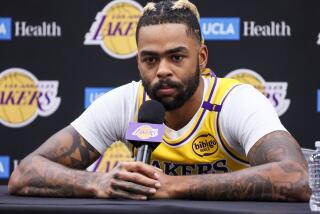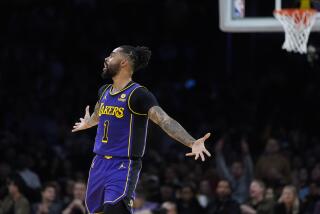Elton John & Leon Russell: Keyboard colleagues
Few people can get away with telling an anecdote about being on safari in Africa and make it sound like a trip to the supermarket.
But for Elton John, that’s precisely how and where he became inspired to call his keyboard-playing pal Leon Russell after more than three decades since they’d last spoken. That call ultimately led them to record “The Union,” a duet album coming out Oct. 19.
“In 2008, I did a [Sundance cable channel] program called ‘Spectacle,’ which I produced with my partner, David Furnish,” said John, 63, referencing the Elvis Costello-hosted music interview-performance series he helped create. “I chose three singer-songwriters to talk about that I thought had been neglected: one was David Ackles, one was Laura Nyro and one was Leon Russell. At the end of the program, I kind of made up a pseudo-Leon Russell song. Because my partner, David, had never heard of these people, he went out and bought all the CDs and put them on his iPod.
“In January of 2009, I was in Africa on safari, getting ready to go to lunch, and David started playing Leon’s greatest hits,” John told a small audience gathered recently at the West Los Angeles recording studio where he, Russell and producer T Bone Burnett recorded “The Union” earlier this year. As he sat on a swivel chair in front of the studio’s expansive mixing board with the studio lights dimmed, Burnett looked on from a few feet away while Russell, 68, relaxed in an overstuffed recliner chair at the back wall.
“About four tracks in I started to weep uncontrollably, and [Furnish] said, ‘For God’s sake, what is wrong?’ I said, ‘This takes me back to one of the most beautiful times in my life: the late-’60s and early-’70s,” John recalled. “Leon Russell was my idol; he became my idol, became the person that I wanted to play like, that I wanted to sing like and who I eventually met at the Troubadour club on the second night I came here in 1970.”
That was during the week of performances at the fabled West Hollywood club that made John a star virtually overnight.
“He was sitting in the audience with his long, silver hair and his glasses, frightening the hell out of me,” John said, “but after the show [he was] so incredibly sweet. We consequently went and did some shows together…. It was wonderful to be able to tour with your idol and be treated so sweetly by someone who, really, you thought could have eaten you for breakfast as far as it comes to playing the piano.”
Russell remembers that tour from a slightly different perspective. Of that night at the Troubadour, he said, “I think he might have been a little nervous being it was his first time in America. I really wasn’t bowled over — until he was opening some shows for me. I went out to see his show and I thought that my career was over. It was really quite fantastic.”
Indeed, there was a time in 1970 and ‘71, after both had released their debut albums, when each was poised for major star status: John from an outpouring of critical raves for the beauty and sensitivity of such early numbers as “Your Song” and “Sixty Years On,” many of which he and lyricist Bernie Taupin wrote out of their love for American country and gospel music; Russell lauded for swampy rockers such as “Delta Lady” and “Roll Away the Stone” as well as heart-rending ballads such as the oft-recorded “A Song for You” and “Superstar,” which became a No. 2 hit for the Carpenters in 1971.
At that point, Russell had the greater momentum, coming off stints working as a bandleader for Joe Cocker and Delaney and Bonnie Bramlett, having established himself previously as a top session player in the Los Angeles amalgam of studio aces known as the Wrecking Crew for knocking out hit after hit for Phil Spector, the Beach Boys, Frank and Nancy Sinatra, Sam Cooke, the Fifth Dimension, Sonny & Cher and on and on.
Soon, however, John’s career eclipsed Russell’s as he soared to the top of the pop charts and stayed there throughout the ‘70s and much of the ‘80s and ‘90s as well. Or as Russell succinctly puts it: “He went to the top and I went to the bottom.”
Russell hit his chart peak in 1972 with the single “Tight Rope,” which reached No. 11, and subsequently traveled pop music’s rootsy tributaries, exploring country, blues, gospel and jazz. He has continued to write, record and release albums on his own Leon Russell Records label, but he hasn’t dented the national album sales chart in nearly 30 years.
“Mo Ostin [former Warner Bros. Records president] said I had catholic tastes,” Russell said with a little chuckle. “What that meant was I made it very hard on [radio] program directors. I was not a brand that they could always expect was going to be the same thing. I’m not as aware of categories in music as some people are. To me it’s just music. I’m interested in all kinds of music.”
John, meanwhile became the biggest-selling artist in all of pop during the 1970s.
So 30-plus years later, John decided that he hadn’t done enough for the man whose music he so admired.
“I listened to these CDs and I said to David…’I really have to speak to this man and tell him how much I love him and how much I miss him and how much his music means to me.’ ”
With the help of John’s U.S. manager, John Barbis, John did just that.
“I told him the story, as well about breaking down when I heard his music and how much it meant to me,” John said, adding, “‘When I come back to America, I’m going to look you up and we’re going to get together.’ And I put the phone down, and I thought, ‘Yeah, well, that’s not quite it.’” So he called back and invited Russell to make an album together.
“I was kind of flabbergasted, really,” Russell said. “I hadn’t spoke to him in 35 years, and he called up and said ‘Let’s do a duet album.’ I said, ‘Sure. Thank you very much.’ ”
Enter T Bone Burnett. John told the 10-time Grammy winner how much he adored what he did bringing Robert Plant and Alison Krauss together on the “Raising Sand” album, and said “If you ever do another duet record, would you ever consider doing me and Leon?”
“T Bone got out his computer and played us a Mahalia Jackson video from the Newport Jazz Festival, ‘Oh Lord, Didn’t It Rain.’ And of course Leon is a huge gospel fan, and I am, and we had two pianos in the studio,” John said. “I went out and started playing a song, which became ‘A Dream Come True.’ Leon came and started playing with me, and we wrote that song together. That really broke the ice, and from that point on we knew this was going to work.”
John and Taupin came up with new several songs for the session, among them “Monkey Suit,” a quintessential piano-pounding rocker, while Taupin and Russell crafted “I Should Have Sent Roses,” a haunted ballad of a relationship that inexplicably fell by the wayside. Burnett, John and Taupin collaborated on writing “Jimmie Rodgers’ Dream,” the title referencing the 1920s and ‘30s singer and songwriter often referred to as “the father of country music.”
John and Russell’s initial collaboration for the record, “A Dream Come True,” is a rollicking gospel-infused rave-up featuring, as do most of the tracks, both men banging, caressing or tickling the piano keys in complementary fashion, John in the left channel, Russell in the right in Burnett’s sonically marrow-deep production.
For John, “The sessions were the happiest I’ve ever been on,” he said, adding with a wickedly wry smile, “and I’ve been on some happy sessions in my life, believe me.”
They’re heading out on a joint tour that includes a Nov. 3 stop at the Hollywood Palladium. For John, it’s irrelevant whether it comes close to the level of popularity of his periodic dual piano tours with Billy Joel.
“All I wanted for Leon is to have in his later life, the accolades that seem to have been missing for him in the last 35 years,” John said. “For me, he’s one of the greatest American treasures we’ve ever had in this country. He’s played on so many wonderful records, you won’t believe what he’s played on, you won’t believe who he’s played with. And for his own, he was the greatest bandleader of the late-’60s and early-’70s. At the [ George Harrison-helmed] “Concert for Bangladesh,” [Joe Cocker’s] “Mad Dogs and Englishmen,” he was the man. He walks into a room of musicians, sits down at the piano and he still is the bandleader, he still is the man.
“I want his name written in stone, I want him in the Rock and Roll Hall of Fame, I want his name to be on everybody’s lips again, like it used to be,” John said. “I think it’s such an important story, because Leon is now rehabilitated — not fully yet in the world of music, but by the end of this year, by God he will be.”
More to Read
The biggest entertainment stories
Get our big stories about Hollywood, film, television, music, arts, culture and more right in your inbox as soon as they publish.
You may occasionally receive promotional content from the Los Angeles Times.










